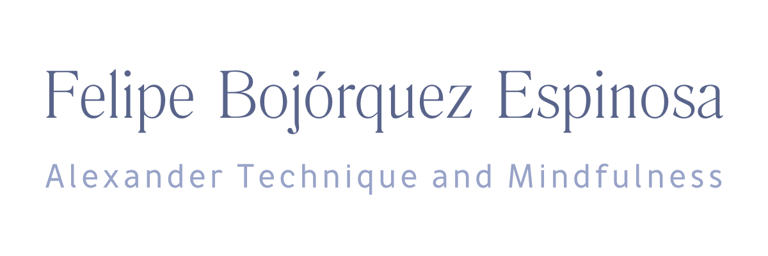El poder de los hábitos en el aprendizaje musical
TÉCNICA ALEXANDEREDUCACIÓN
Felipe Bojórquez Espinosa
The Power of Habits in Musical Learning
From our earliest days, we demonstrate an extraordinary capacity to learn. As babies, we interact with the world without formal instructions, exploring, experimenting, and repeating what feels fun or satisfying.
These early experiences not only shape our cognitive and motor skills but also establish patterns that can stay with us throughout our lives.
How much of what we inherit is genetic, and how much comes from imitating behaviors we observe around us? Mimicking gestures, breathing patterns, ways of speaking, and how we relate to others forms early habits that influence the way we learn and navigate the world throughout life.
Observing child development, it’s clear that learning is fast and flexible. Skills are acquired progressively and constantly adjusted as we refine our coordination and understanding of the environment. The willingness to make mistakes and repeat attempts without fear of failure promotes natural, fluid learning.
However, as we grow and face the pressure to “do things correctly,” this ability diminishes, showing that openness to error is an essential component for rapid and deep learning.
The Nature of Our Habits
A habit can be defined as a behavioral pattern developed over time, often repeated automatically and largely subconsciously. These patterns can be helpful but also limiting—or even harmful. Changing habits can be challenging, especially without conscious motivation to do so.
To help us re-educate habitual reactions, F. M. Alexander invites us to consider our “Use”: the way our mind and body interact and affect the functioning of our organism.
There’s a sense of security in familiarity; repeating known patterns gives us confidence, even when they are negative. The challenge lies in recognizing and questioning these behaviors, understanding that mere desire for change is not always enough to alter deeply ingrained habits. Alexander Technique provides a framework to observe, evaluate, and consciously transform our habits by working with thought and movement simultaneously.
Free Will and Conscious Choice
Free will manifests when we understand that we can choose among different courses of action in response to any everyday stimulus. This ability allows us to inhibit automatic, impulsive responses and cultivate more conscious decisions.
Even in childhood, we experience this power of choice: deciding whether to eat a candy immediately or wait teaches us to discern between impulse and deliberate decision. This recognition of conscious choice is fundamental for managing habits and improving skills, both in daily life and in artistic disciplines such as music.
The Difference Between Habit and Skill
Every skill we acquire—playing an instrument, riding a bike, or learning a language—is built upon functional habits.
When we practice, certain behaviors become automatic, allowing us to focus on more complex levels of execution. Conscious practice and external feedback help these habits evolve into refined skills, although complacency can limit continuous improvement.
Skill involves not only technical mastery of an activity but also continuous adjustment of our Use, which expands our field of attention and our capacity for coordination, interaction, and expression.
Essential Habits and Psychophysical Unity
Essential habits form the foundation for handling daily life efficiently. However, risk arises when these patterns become rigid, limiting our flexibility in action and thought.
Alexander observed that not only physical coordination can get trapped in habits but also our mental and emotional attitudes. His concept of “psychophysical unity” reflects the interdependence of mind and body: working simultaneously on both levels enables more complete and healthy learning.
Musical practice, for example, requires awareness of posture, breathing, balance, and movement. Ignoring bodily signals of discomfort or tension limits our learning ability and reinforces harmful habits.
A body that is alert and comfortable enhances skill acquisition and facilitates artistic expression.
Emotional Response and Musicality
The emotional dimension is inseparable from musical technique. Music exists to convey emotional content, and performance requires that expressive movements align with our emotional intent. Yet, these patterns can become automatic and limit spontaneity.
Alexander believed that emotional awareness should be integrated into the psychophysical approach, allowing flexible and authentic responses. Interacting with other musicians and staying fully present in each performance expands expressive possibilities and strengthens creativity.
Our habits not only determine behavior and skills but also offer a constant opportunity for improvement. Observing, evaluating, and consciously transforming them, as Alexander suggests, allows us to:
Refine technical and expressive skills
Improve body and mental awareness
Strengthen creativity and spontaneity
When mind and body work in unity, practice becomes a space for continuous growth: each movement, each breath, and each gesture is part of an integrated process that enhances expression, coordination, and learning capacity.
Thus, habits not only shape our skills but also serve as a vehicle to develop a more balanced, conscious, and authentic Use of ourselves.
Related articles
Well-balanced flutist
Alexander Technique and Mindfulness in everyday musical practice.
Specialized support for high-performance flutists and flute students.
© 2025. All rights reserved. Privacy policy.
Menu:
Lessons
About me
